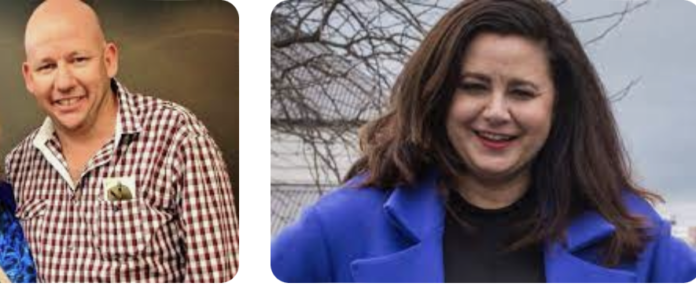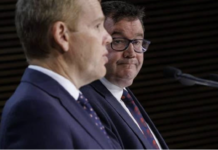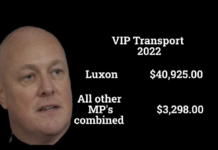Behind the paywall at the NZ Herald is the poorly read ‘Media Insider’ column from Shayne Currie.
His latest poorly read column talks about an important lesson that he learned as an Editor in 2005 about a rogue journalist who lied to him about a news story…
The phone call is still seared in my memory. I was sitting in my editor’s office in the Herald on Sunday, listening in as the newsroom leaders and reporters gathered for the weekly editorial planning meeting. It was Tuesday, October 18, 2005.
It was a typically lively news meeting. In those days we had no website to worry about – the NZ Herald, Herald on Sunday and nzherald.co.nz operations were separate, under individual editors. We needed only worry about our upcoming newspaper – the Herald on Sunday had just celebrated its first birthday and was finally finding its feet in the competitive Sunday market.
On that Tuesday morning, we were reflecting on a strong paper from three days earlier – a mix of prime weekend journalism, including a boy racer who was back behind the wheel after surviving a crash that killed four mates; a New Zealand Idol contestant described as overweight by a leading entertainer; and an exclusive interview with an Auckland police officer convicted of assaulting a teenager.
As the newsroom meeting was in full swing, I received a phone call from John Haigh QC, the pre-eminent lawyer who had earlier represented that police officer in court.
He opened the conversation along the lines of: “We have a problem.”
Newsrooms are unique places, fuelled by caffeine, creative ideas, and a sense of purpose.
They are not factory lines producing paperclips or fast-food outlets churning out cookie-cutter hamburgers and sides of fries.
Every interview and story has nuance and unique detail; there are so many variables in newsgathering. And the difference between a humming news day and a slow, boring slog is stark.
Newsrooms and journalists operate in a high-trust environment, more so than many other industries. Trust that we will handle and present people’s stories and difficult topics with care and sensitivity; that we will get those stories right, and that we’re fair and balanced.
Reporters play a critical role in crafting the first draft of history. We place trust in our journalists that they are accurately recording, and portraying, what a person has said to them. We place trust in editors to probe that work – to query any missing points or clarify confusing passages. We place trust in production staff and digital editors to edit and present that journalism with precision.
And we trust that our journalists have actually spoken to a person in the first place.
On that Tuesday morning in October 2005, John Haigh QC was calm and pleasant on the phone.
But he was clearly bemused by the Herald on Sunday article quoting the Auckland police officer. His client, he said, had never met, let alone spoken to, our reporter.
I clearly remember looking across at the reporter in the editorial meeting. I told Haigh I would call him back – to be frank, I had few qualms at that point; this was a highly experienced journalist with many scoops under his belt.
Any concerns I did have were further eased after the newsroom meeting. The reporter reiterated that he had indeed met and spoken to the police officer at his home. Yes, he had notes (the news editor had sat with the reporter and seen his notes); and yes, he would get me those notes.
Satisfied, I called Haigh back and told him all of this, suggesting he might want to jog his client’s memory of our reporter’s visit the previous week. I remember thinking Haigh’s client was probably trying to cover his own back.
Haigh called back again. His client was adamant: there had been no meeting, no interview. Clearly at at a stand-off, I suggested we get the two men into a room, with us both present. It was an idea to which Haigh seemed receptive.
I ventured into the newsroom to see the reporter, thinking I also needed to see those notes.
He was nowhere to be found.
That week turned out to be one of the worst of my career.
I spent several days personally trying to find the reporter after he had left the newsroom, doorknocking houses in Auckland and trying to reach him through family, friends and colleagues. By now I was dealing with a formal complaint from Haigh and the police officer; and a publisher, like the rest of the newsroom, seeking an explanation.
We suspended the reporter on the Wednesday and terminated his contract – after finally finding him and conducting an employment meeting – on Friday.
…isn’t that beautiful?
Shayne learned his lesson about taking a Journalist at their word without seeing their notes in 2005.
Isn’t that wondrous?
Pity he seemed to have forgotten that lesson in 2015 when Rachel Glucina pretended to be a PR consultant rather than a journalist in the John Key Ponytail pulling scandal. TDB broke that Ponytail story and wrote the following after I learned of that deceit ..
After the young woman contacted me aggrieved about the way she had been treated, I called the NZ Herald at 11.08pm and spoke to their editor Shayne Currie. I told Shane that there was a dispute by the woman and that she had been told Rachel was a PR advisor who was helping protect the reputation of her employers and that she withdrew her permission for the photos to be used or her comments.
If you are reading this and the NZ Herald has printed their exclusive interview, they did so knowing that the woman in question had removed her consent after feeling deceived.
…remember how the BSA ripped Shayne to pieces in one of the most savage rulings the BSA has ever handed out over the way NZ Herald and Glucina gained that interview…
Press council rules against Herald on ‘Ponygate’ interview
On April 23, the New Zealand Herald published, front-page and online, an article about Amanda Bailey and the controversy over her reaction to the Prime Minister, John Key, when he persistently pulled her ponytail at the cafe where she worked as a waitress.
The Press Council has upheld the substance of the complaints. This is a brief outline; for the full Press Council decision, in two parts, please see www.presscouncil.org.nz.
Lisa Finlay, Bronwyn Hayward, Leanne Hermosilla, Josh Hetherington, Rob Stowell, Jasmine Taylor, Giovanni Tiso, Daniel Webster and Julia Woodhall complained that the article breached several Press Council principles.
Key concerns were:
• The Herald columnist, Rachel Glucina, had misrepresented as PR rather than newsgathering the basis on which she was conducting the interview that led to the article (subterfuge).
• The columnist’s and her brother’s connections with the cafe owners and the columnist’s connection with John Key were not disclosed (conflict of interest).
• There was no clear consent from Ms Bailey concerning publication in the Herald.
• The Herald failed to contact Ms Bailey after it became apparent there were concerns about the article prior to publication, dealing only with the cafe owners.
In short, the complaints stated the Herald had failed to act transparently and in good faith with Ms Bailey and had breached professional standards.
The Press Council cannot rule out the possibility of a genuine misunderstanding in the first instance about the nature of Ms Glucina’s approach and the article she proposed to write.
However, once the interview was taking place, the onus was on Ms Glucina as a professional media person to make the position completely clear to all parties, particularly to Ms Bailey, with whom she had had no previous contact, who was in a vulnerable position, and whose interests could well have been in conflict with those of the cafe owners.
Ms Glucina, and the Herald in the later dealings, could not delegate to the cafe owners the obligation to ensure Ms Bailey understood the nature of the proposed article in consenting to the interview. The Herald did not act professionally and with fairness towards Ms Bailey.
The council also finds a breach of the conflict principle in that the Herald did not disclose Ms Glucina’s relationship with the management of the cafe.
The Press Council is concerned with maintaining the press in accordance with the highest professional standards. In its view, the Herald, in respect of the Glucina article, has fallen sadly short of those standards.
…pity the lesson Shayne learned in 2005 was forgotten by 2014.
Increasingly having independent opinion in a mainstream media environment which mostly echo one another has become more important than ever, so if you value having an independent voice – please donate here.
If you can’t contribute but want to help, please always feel free to share our blogs on social media





Martyn – NZ Herald is on the way out due to this, and many, many other silly stuff
So, Shayne is not particularly good at his job?
Just because he is exceedingly loquacious, and sounds like a Meghan Markle clone, and has invaded an absent person’s privacy, and others’ privacy, and is trying to appear intelligent, and may be having memory problems, doesn’t mean that there’s not a place for him, somewhere. Be kind.
Ha! Explains the Putinesque paywall…
Ha! Explains the Putinesque paywall…
Yes that’s a fine example of why trust in media began to spiral, politics mixed in with the “truth”.
I’m sure it’s gone on like that forever to some degree but now with technology the old newspaper isn’t burned or wrapping fish and chips, it’s right there for us to see and remember. It’s harder to fool some of the people all the time.
Speaking of bemused , I still don’t understand how some commentators are blaming the RNZ Tankie scandal on underfunding.
Saw the woke Newsroom muppet claiming such on whatever morning political show the other morning.
I mean, do RNZ not read their own stories but expect the public to? Not just editors but even staff members, no one read these articles and raised an eyebrow?
Why don’t they read their own stories even when editors are paid to do so? And how come if it’s underfunding this didn’t happen under Key but for the last 5 years of increased Labour funding?
Or is RNZ as is more likely, such an echo chamber that severely, factually incorrect slanting (and especially failing to correct attribution) of stories is just the norm? As long as it’s some sort of pseudo Marxist propaganda then they are doing gods work?
With a crappy name like Shayne, cowboy posturing like a professional person was never going to work, bloody hypocrite. What was done to John Key’s young victim was a gross abuse of power for no reason other than to protect a slimey serial abuser because rich white man= good. A kid from Manurewa or Porirua wouldn’t have been able to torment a girl the way John did and not only get away with it, but enlist the press to revictimise her. Journalistic integrity is unknown at the Herald IMO. I think they tried to fling faeces at Posie Parker’s “Let Women Speak “ event too, the misogynist creeps.
So we don’t actually have journalists in this country but stenographers who don’t know what they do? Yeah, sounds reasonable.
Yeah but what I want to know is what’s behind the paywall on Shane’s article on why Karen Hay got the boot?
She was always a bit imperious from way back but I cant help wondering whether she was run out for not being woke enough? Young enough? Who knows?
Seems the easiest way to get rid of old journo’s is by getting woke, aggrieved 20 somethings to complain about them. Devlin, SantaMaria and various others. And at this stage, I imagine RNZ is just as likely to succumb to this as any other outlet.
I read it, basically a story about nothing. She was a bit confrontational, aggressive and shouted.
No detail.
Do you regularly listen to RNZ in the evenings. I do most nights of the week, she was a shocker frankly I could never understood how she got that particular slot. Apparently a producer complained about her. She was never really intelligent enough to do that sort of show.
Hay was the last RNZ presenter worth listening to.
Bloody shame she’s gone.
I am sure she gave some low talent woke wanker a telling off.
Tsk tsk.
Maybe everyone got sick of her 90’s indie schtick – always came across as someone living off glory days long since past. Although I also thought she prepared well, for all that it was.